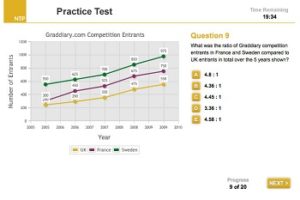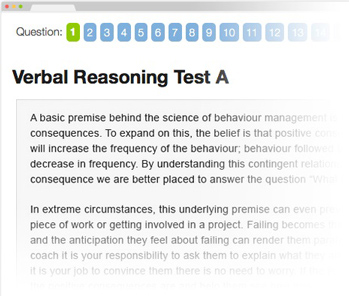
Over 70 % of large companies currently use psychometric tests as part of their selection process to gather vital information from potential employees, according to AGCAS. But what exactly are psychometric tests and how can you prepare effectively for them?
What are psychometric tests?
Aptitude/Ability Tests test your capabilities, usually in numeracy, understanding text and logical problem solving. They are generally multiple choice, timed, lasting around 30 minutes each with 20-30 questions to be completed.
Tests often take place at an early stage of the recruitment process and are online. This is usually after you have completed the application form and it has been reviewed by the employer. Often at a later stage, such as an assessment centre, employers will often ask you to take a further test in person, to check that it was really you that completed the online test before offering you the job.
Tips for doing well in Aptitude Tests:

- You need to be both quick and accurate
- There’s not usually time to check each answer as you go. If you have time left at the end, that’s your opportunity to look again at questions you’re not sure about.
- Work steadily; questions tend to get more difficult as the test progresses, although an easier question can be placed amongst harder ones.
- It may not be possible to answer all the questions in the time given.
- Practise by doing puzzles, answering quizzes, playing cards, “Test your IQ” books etc. All provide experience of answering short questions at speed.
- See below for details of practice tests and useful websites.
Tips for doing well in Numeracy Tests:

- Brush up your arithmetic. Numerical tests are not purely arithmetical but it will help. See Further Information for sources to help with this. You need to be completely comfortable with working out percentages, exchange rates, time differences, time/speed/distance calculations, reading charts, graphs and tables.
- Revise your multiplication tables.
- Practise mental arithmetic by working out prices/weights/values when shopping.
- You may not be able to use a calculator. Your results will always be compared with candidates who have had the same access, or lack of, to a calculator as you.
Tips for doing well in Verbal Reasoning Tests:

- You are generally given a written passage of text and asked to use that information to answer questions.
- Use only the information given in the text to decide on your answer – it’s not a test of your general knowledge but a test of understanding.
- It’s quickest to read the questions first, then read the passage, seeking out the answers to the questions. Be sure to read the whole passage though.
- Develop your skills in quick comprehension by reading an article in a serious newspaper and summarising each paragraph in a sentence or two.
Practice, practice practice! Resources for practice tests and helpful materials
- The Employability & Careers Centre offers a complete practice test for free online – with sections on numerical, verbal and abstract reasoning. You can access these tests at profilingforsuccess.com/take-an-assessment.php Contact us at careers@surrey.ac.uk to get the login details. After you have taken them you will receive a report via email with your results. If you are concerned about your results then you can make an appointment with a careers adviser to discuss them.
- You may also like to access the free e-learn resource provided by PwC pwc.co.uk/careers/student/employability/employability.html which gives useful practice on Numerical Reasoning, Verbal Reasoning and Inductive Reasoning.
- Job Test Prep https://www.wikijob.co.uk/content/aptitude-tests/test-types/what-psychometric-test helps students to prepare for a large variety of aptitude tests used by employers and includes over one hour of free practice sessions. Includes preparation for the Watson Glazer Critical Thinking Test.
- SHL Talent Measurement cebglobal.com/shldirect/en – major producer of tests used in UK graduate recruitment.
- TARGETjobs targetjobs.co.uk/careers-advice/psychometric-tests
- Cubiks: cubiksonline.com/cubiks/practicetests/
- Psychometric Success psychometric-success.com
